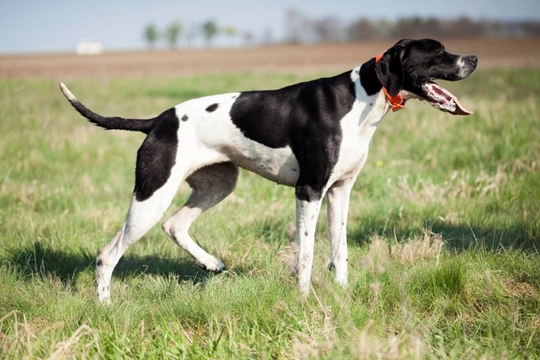
Gout in the pointer dog breed
Pointers were originally bred and kept as working gundogs, and used to find and “point” prey out to hunters using a distinctive stance and alert without attacking or harming the prey in question. As a dog breed that is handsome, versatile and intelligent, pointers today are popular as pets all over the UK, and for people looking to buy an energetic, smart and very personable dog, pointers are definitely worthy of consideration.
The Pointer breed as a whole also tends to be robust and healthy, living for an average lifespan of 12-14 years and with many dogs of the breed reaching their late teens. However, pointers do have certain risk factors for hereditary health conditions that can be found across individual breed lines, and this is something that all pointer owners and prospective owners of dogs of the breed should be aware of.
One rather unusual health condition that pointers can be prone to is one that isn’t commonly seen in dogs at all – gout.
Gout is the term we use to refer to a build-up of uric acid within the body’s tissues, which can cause pain and other problems, and which can in extreme cases prove fatal if left untreated. In this article we will look at gout in the pointer dog breed in more detail, and provide some information on the condition for pointer owners and would-be owners alike. Read on to learn more.
What is gout?
Gout is something that we more commonly associate with people than dogs, and it is certainly much rarer in dogs than in humans. Canine gout is actually considered to be quite unusual, but certain breeds like the pointer have elevated risk factors for it, and are more likely to develop the condition than most other breeds.
Gout is caused by excess uric acid building up within the body, which is circulated through the bloodstream and cells and becomes deposited into soft tissue, and sometimes bone tissue too.
As is the case in humans, gout most commonly tends to affect the dog’s legs and feet, and results in the build-up of lesions caused by calcium deposits. This can cause pain and discomfort and make the dog unable to walk comfortably or normally, and in extreme cases of gout that are left untreated for a long time, it can actually prove fatal.
What sort of pointers are at risk of gout?
Gout is, as mentioned, a rare condition in dogs and even in breeds that have a higher level of susceptibility to it (like the pointer) it is still quite uncommon. Exactly why this is, we don’t know – in other dog breeds that are also more susceptible to gout, a genetic disorder that makes the dog’s body unable to properly absorb uric acid in the liver and so, eliminate it from the body is thought to be the cause, and this may be the case for pointers too.
Pointers of any age and either gender may potentially develop gout, although it is uncommon in younger dogs and seems to be slightly more likely to affect males than females. Pointers who have close relatives with their own history of gout are at higher risk of developing it themselves.
What are the symptoms of gout in dogs?
The symptoms of gout in pointers can be diverse and varied, depending on how it affects any individual dog and how acute it is. This can make it a challenge to identify from the symptoms you may spot at home, and you will need to speak to your vet if you have any concerns to get a formal diagnosis.
Some of the most common symptoms of gout in dogs that you might be able to identify include:
- Lumps, growths or hard areas on the paws and/or between the toes, which may bleed or discharge a whiteish substance.
- Blood or gritty-looking crystals within the urine.
- The need to urinate frequently, often producing only a small volume of urine.
- Cysts developing on the dog’s neck and limbs.
- A dog with gout may be in pain and uncomfortable, which may make them reluctant to play an exercise as normal.
- The pain and discomfort of gout can also lead to behavioural changes in your dog, such as becoming less obedient or tolerant of things.
Can gout in pointers be treated or cured?
Whilst gout can be painful and debilitating for dogs and can make them feel quite miserable, it can usually be managed and treated effectively with the right approach and a timely intervention.
Dietary changes to reduce uric acid build-up might be indicated, and your vet might wish to prescribe a supportive veterinary diet for your dog.
Hepatic (liver) medications or other options may also be prescribed, to resolve the issue of the liver being unable to absorb uric acid and excrete it properly.
If the dog has developed sores and lesions on their paws as a result of gout, these will also need to be treated and kept clean and dry, to protect them from infection.
The right approach for your own dog will depend on your vet’s opinions and the presentation of the condition, but one thing to bear in mind is that there is a hereditary element to canine gout and so dogs that have been diagnosed with it should not be used for breeding – even if they have been treated successfully.



